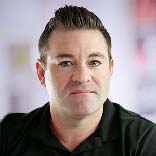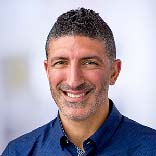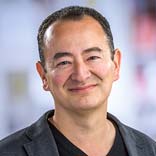The overarching goals of the Translational Research Program are to discover and translate molecular and epidemiological findings. To achieve our goals we conduct research in the laboratory and in the clinic. Our laboratory research is aimed at advancing our understanding of the biological basis for various exposure-disease relationships. Our clinical efforts are focused For improved risk assessment, early disease detection, prognostication, treatment decision making and survivorship.
We strive to help the implementation of personalized medicine or the tailoring of specialized and individualized treatment to the specific characteristics of the disease. In practice, this means using molecular profiles of tissue or blood samples to accurately predict a person's susceptibility of developing disease, the presence of disease, disease prognosis and its response to different treatments.

Dr. Sunil Hingorani reviews DNA fragments

Dr. Kevin Cheung listens to a presentation at the Seattle Translational Tumor Research Precision Medicine Retreat

Dr. Chris Li speaks during the Circle Series presentation at the Fred Hutch
Cancer Early Detection
Our researchers discover and validate novel early-detection biomarkers for multiple cancers including breast, colorectal, lung, melanoma, ovarian, and pancreatic cancers
Risk Assessment and Exposure Assessment
Current efforts include the discovery and validation of transcriptomic and genomic predictors of cancer progression and survival, as well as the effects of diet and lifestyle on biomarkers of cancer susceptibility.
Tumor Biology
Faculty use multiple approaches to explore cancer pathogenesis and progression, including the use of mouse models, cell cultures, and mitochondrial DNA.
Cancer Metastasis and Tumor Microenvironment
Several faculty members are focused on advancing our understanding of cancer metastasis and tumor dormancy through in vitro, in vivo and human studies.
Technology Development
Several novel technologies have been developed by program faculty to advance translational cancer research, including the development of bead-based ELISA assays; the Random Mutation Capture (RMC) assay; high density antibody arrays for high throughput proteomic, glycomic and autoantibody biomarker discovery; technology for interrogating the metabolome; and high-throughput sequencing approaches to characterize the gut microbial community.
Research Labs

Alvarez Lab
The Alvarez Lab is committed to understanding the cellular and molecular basis of breast cancer recurrence. They take a multidisciplinary approach to this problem, with a focus on identifying the unique biological properties of dormant residual breast cancer cells, which are the reservoir for tumor relapse. The ultimate goal of their research is the discovery of therapies that can prevent tumor recurrence.

Bielas Lab
Using a methodological approach, researchers study the implications of nuclear and mitochondrial DNA mutations in the development of cancer and age-related disease

Barry Lab
Using human immunology, models of cancer, and cutting-edge methods (such as intravital imaging, multiparameter flow cytometry, and single cell RNAseq) we are working to elucidate the pathways controlling innate immune responses to cancer. Our goal is to generate the basic scientific understanding needed to generate novel therapies to boost protective immune responses to cancer.

Cheung Lab
The Cheung lab explores the cellular and molecular mechanisms by which tumor cells invade, circulate and metastasize as clusters of cells.

Laboratory for the Study of Metastatic Micorenvironements
Cyrus Ghajar directs the Laboratory for the Study of Metastatic Microenvironments (LSM2), exploring how microenvironments of distant tissues regulate quiescence, therapeutic resistance, immune evasion and re-emergence of disseminated tumor cells (DTCs). Their goal is to develop treatments that eradicate DTCs before they progress to metastases.

Paul Lampe Lab
The Lampe Lab investigates the control of cell growth both at the biological/mechanistic level and through cancer biomarker discovery. Researchers study the cell biology connecting gap junctions and intercellular communication (GJIC) with the control of cell growth, the cell cycle and how the relationship is disrupted during carcinogenesis.

Li Group
The Li Group uses multidisciplinary approaches to study the etiology and outcomes of breast and colorectal cancers. Current projects identify novel biomarkers for early detection, evaluate risk factors, identify predictors of poor outcomes, and assess racial/ethnic disparities in stage, treatment and survival.
Contact Us
Mailing Address
Translational Research Program
Fred Hutchinson Cancer Center
1100 Fairview Ave. N.
Mail Stop M5-A864
PO Box 19024
Seattle, WA 98109-1024
